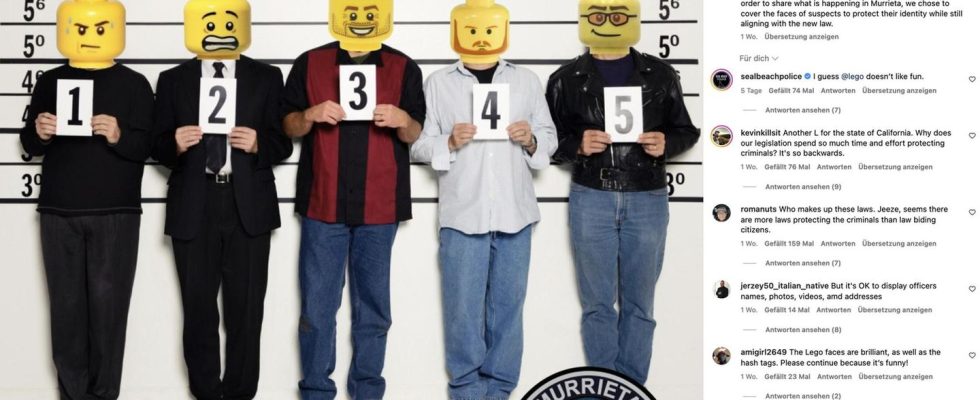California
US police post criminals with Lego heads – to the displeasure of the toy manufacturer
The edited photos may be amusing for the internet community, but not for Lego
© @murrietapd / Instagram
A suspected thief with a desperate expression or a suspiciously sweating man in black: the police photos from a precinct in California look incredibly dazzling. That’s because of Lego.
It’s a move that’s garnering a lot of attention and amusement on social media. A police department in the south of the US state of California publishes photos of suspects on Instagram and the like – with Lego heads retouched on their shoulders. For more than a year, the Murrieta department has been posting doctored photos of people being led away in handcuffs or with their hands raised in a defensive posture. A few days ago, one of these posts went viral, the Associated Press news agency first reported – with consequences for the police department.
Publishing photos of suspects is not unusual in the United States. Various authorities celebrate “Mugshot Monday” or “Wanted Wednesdays” online. The police photos or calls for witnesses are not only intended to help with investigations, but also to strengthen contact with the community.
Lego heads: data protection for suspects
In a post, the police department justified the creative head montages. On January 1st, a law came into effect in the state that restricts the publication of mugshots on social media. Photos of suspects must be deleted after 14 days at the latest, unless there are special circumstances, such as the suspects being on the run or posing a threat to public safety. However, experts had pointed out that the publications could lead to suspects being prejudged could. Even innocent people could potentially be unfairly persecuted by the images.
The police department therefore resorted to Lego heads to make suspects unrecognizable. The department wrote on Instagram: “The Murrieta Police Department prides itself on its transparency with the community, but also respects the rights and protections afforded by the law to everyone, even suspects.” Examples please:
This causes amusement for some users: “I love this!”, someone comments, for example. “Try that with animal faces!” suggests someone else.
But not everyone likes the pictures. Some criticize that the authority protects the rights of suspects more than the general public. However, the images mostly come from suspects, not from perpetrators who have already been convicted.
Lego isn’t happy about the photomontages either. On March 19, shortly after the agency’s post went viral, the toy maker took action, according to a report by the Associated Press (AP). Lego “respectfully” asked “to refrain from using their intellectual property in our social media content, which we of course understand and will comply with,” a police spokesman told the AP. Lego itself did not comment on this.

According to their own statements, the police wanted to be close to the community with the creative photos in order to report on their own work. An actually important step towards more transparency: Trust in the police is declining in the USA. In a survey by the Gallup polling institute, 74 percent of white respondents said they trust the police. In 2021 it was still 79 percent. The values are significantly worse for respondents with black skin. Only 56 percent of these respondents trust the police (2021: 58 processes), a result of police violence against black people.
Sources: Murrieta Police Department, Associated Press, Gallup

